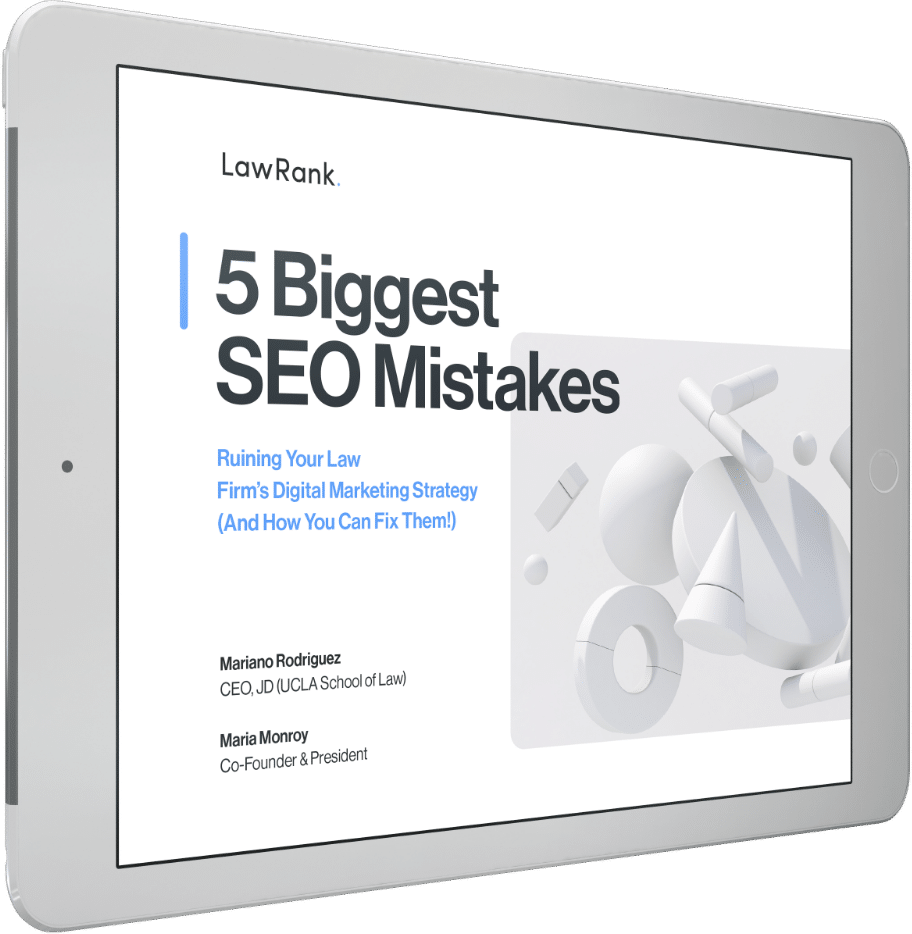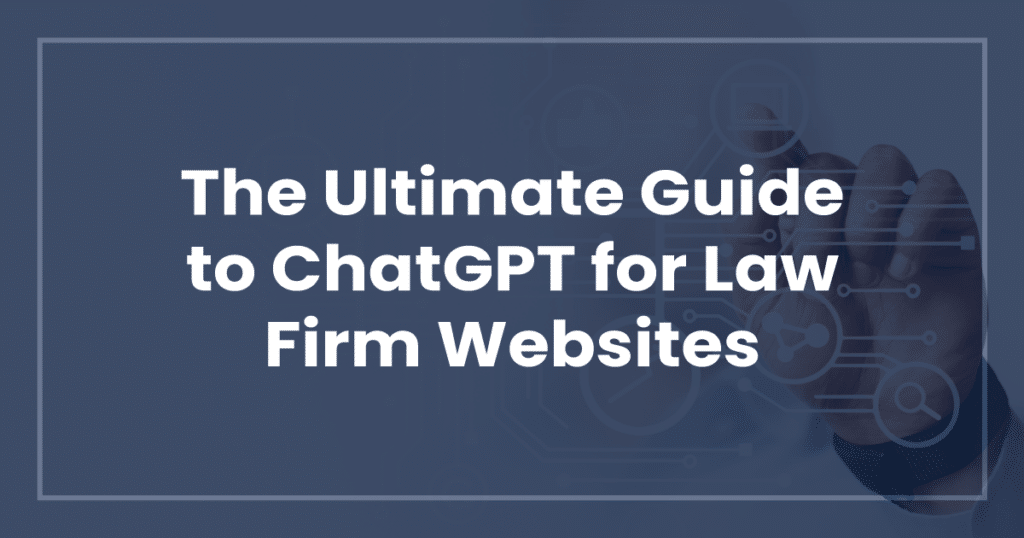
It’s almost impossible these days to consume news, especially tech news, in the legal profession and not come across ChatGPT. The artificial intelligence bot is making news seemingly daily.
It passed a bar exam, although further reporting had to qualify that claim. It powered the “world’s first robot lawyer“, although that lawyer’s first court case had to be withdrawn.
These and countless other stories make it difficult to see where ChatGPT stands as a marketing tool. Is it the next big thing in content creation or a surefire way into legal trouble? Should law firms embrace it as a significant cost saver or run away from it?
The answer, as you might expect, is far from simple. ChatGPT indeed has significant potential for legal marketing. But at the same time, its potential drawbacks cannot be ignored. Join us for a deep dive into the basics and technology behind ChatGPT, as well as its potential uses and limitations in the legal profession.
Just the Basics: What is ChatGPT?
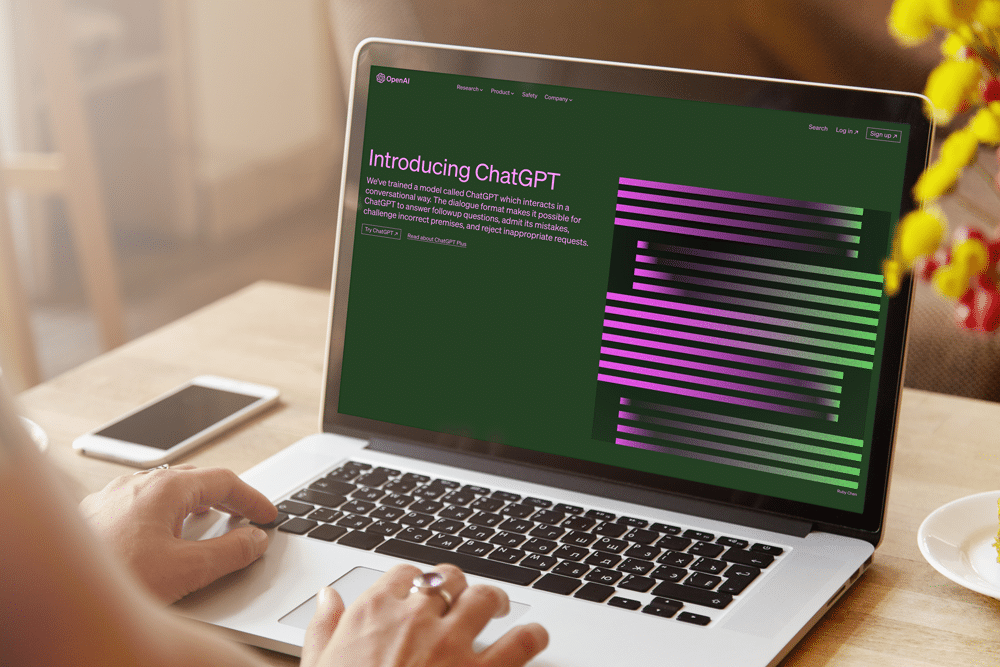
Put simply, ChatGPT is a chatbot that’s powered by artificial intelligence. Specifically, it is built on a language processing model and designed to answer user questions in a conversational style.
The key to understanding ChatGPT is understanding the approach its creators took to make it. Instead of just focusing on the prompt itself, it looks to determine the intent behind a user’s query based on its context, phrasing, and previous questions. The result is paragraphs-long answers designed to be more in-depth and specific than most prior chatbots
This focus on intent and meaning also gives ChatGPT new and expanded interaction capabilities. The software can correct itself when challenged on a mistake, answer follow-up questions that don’t require the entire context to be shared again, and even refuse to answer when it feels the question is unfair or impossible.
The model is so extensive that ChatGPT can write many different types of copy, including:
- Social media posts
- Blog posts
- Website content
- Emails
- And more
It can get more in-depth, as well. In the tech industry, developers are testing out its abilities to write code or find bugs in existing code. If it’s word-based, ChatGPT promises that it can provide a relevant output.
OpenAI and the Technology Behind ChatGPT

A conversational AI like ChatGPT depends largely on the technology behind it. In this case, that’s OpenAI, a nonprofit AI company originally founded in 2015. ChatGPT may be its big hit, but its algorithms are also behind other applications like DALL-E, the image generation app that can create artwork based on text inputs.
Like any AI, the simple equation behind OpenAI’s concept is data input. The bot was initially trained based on massive amounts of open internet data, including 175 billion parameters and 570 gigabytes of text.
And that’s not all: every time someone interacts with it, the bot learns from the interaction and adds that input into future interactions. That learning curve is significant, considering ChatGPT just broke 100 million users within two months of going live.
In other words, the more you interact with it, the more it learns from these interactions. The basic premise is simple: based on its knowledge and data, it creates sentences by always predicting what the next word in the sentence may be. That’s how a simple question can result in an answer spanning multiple paragraphs and hundreds of words.
That sounds promising, and law firms could certainly find a productive use for ChatGPT. But AI also introduces some significant challenges that cannot be ignored. We’ll explore both the opportunities and challenges, starting with the ways in which ChatGPT can help lawyers generate legal content today.
4 Ways Lawyers Can Use ChatGPT to Generate Legal Content
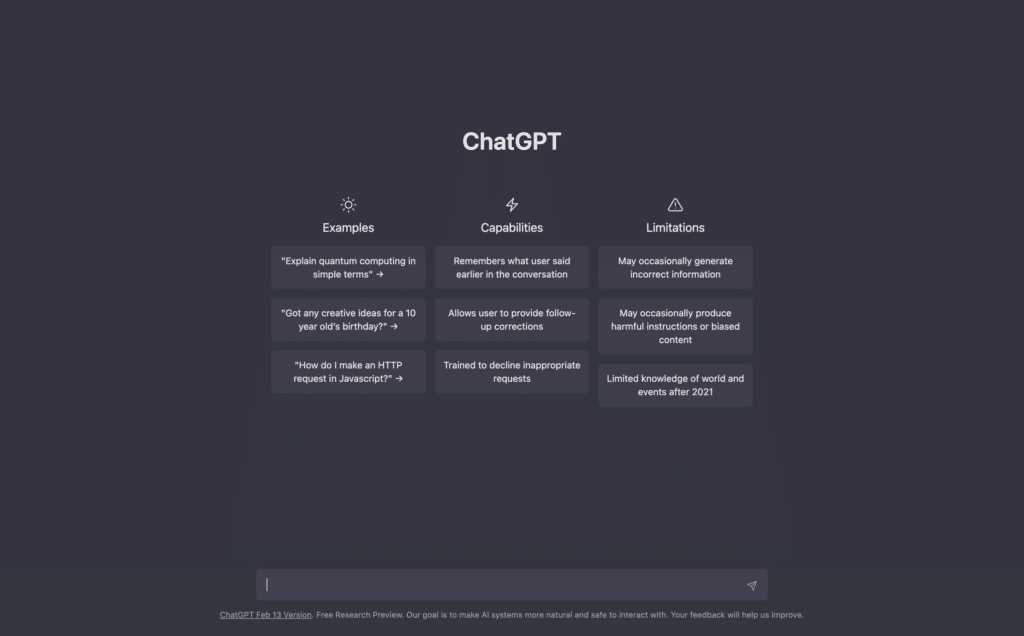
The hype around ChatGPT spans many industries, and it exists for a reason. Perhaps more than any other marketing tool before it, it has the potential to significantly help build legal content that your audiences will find valuable.
The key, though, is not to simply ask it to generate the content on your behalf. As we will examine in the next section, taking this step introduces some challenges, and even legal issues, that no law firm will want to navigate. Instead, it’s best used as a helpful tool that can help with topic ideation, keyword research, content outlines, and headline creation. Let’s dig into each of these in more detail.
1. Using ChatGPT for Topic Ideation in Legal Content
Successful content marketing in the legal profession requires a constant stream of content. You content has to hit a few important notes:
- The content should provide accurate, helpful information to potential clients
- The content cannot substitute for actual legal advice
- The content should assert your authority in your practice area
That’s difficult to accomplish, especially considering the fact that you need more than just a single piece of content every now and then. You might need to sustain your blog, website, podcast, social media channels, and more. ChatGPT can help by brainstorming potential topics to write about.
To get there, you can ask the software to tell you the questions your clients are most interested in learning more about. You can even ask it specifically to provide 10 potential blog post topics about your specialization. The output can give you a great starting point to build your content calendar.
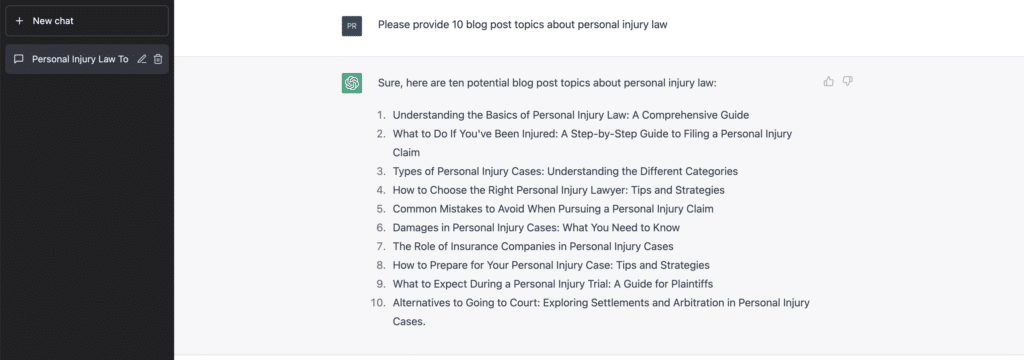
If these potential topics don’t match your expectations, a follow-up prompt can get more specific or ask the platform to take a different direction. Because it accumulates information to keep improving, you can continue to improve the quality of responses (and, by extension, the topics generated) over time.
2. ChatGPT as a Keyword Research Tool in Law Marketing
Every piece of content you post on your website needs to be optimized for search engines like Google. In fact, law firm SEO will be the single biggest driver of traffic for your website. That means not just finding great and relevant topics to write about but also making sure that the content is optimized based on the right keywords and phrases.
Keyword research is complex. You might find any number of terms and phrases that rank on a sliding scale of volume (how often people type these terms into search engines) and competitiveness (how many other websites try to rank for them already).
That process can take time. You might spend as much as a week just coming up with relevant keywords, then another ranking them according to relevance. ChatGPT, when used the right way, can play a major role in significantly shortening that process.
You can start simply. Ask the platform to generate 25 keywords related to your legal specialty and location. Review the first round of results, then get more specific, like asking for a list of keywords related to any content topics you’re working on.
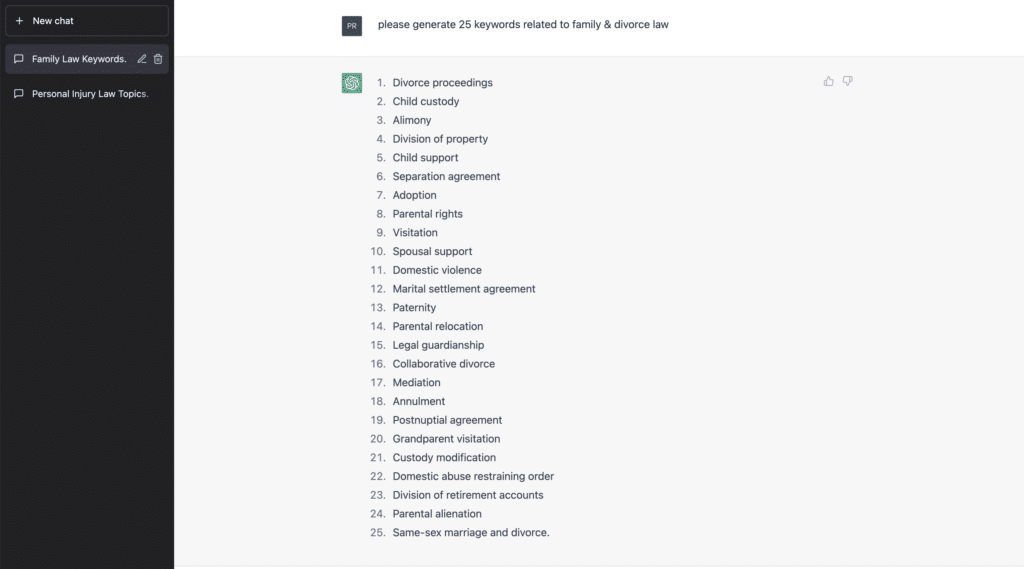
From there, slightly changing your prompts (like asking for long-tail keywords only) can help you narrow down the phrases most relevant for your content marketing.
3. How ChatGPT Can Help to Create Legal Content Outlines
Modern online content needs to be well-structured. To be easily readable, it needs to include plenty of subheaders as well as a clear through-line for skimming. That’s especially true for legal content, which often covers complex topics. Creating outlines before you write an article can help you present information clearly and effectively.
Creating those outlines takes time. Without any tools to help, you’ll need to rely on understanding how competitors are structuring similar articles, what keywords you need to use, etc. With ChatGPT, that process can become much simpler.
In fact, you can ask the platform to simply write the content outline for you. Provide the content topic and focus keywords, and watch it go to work.
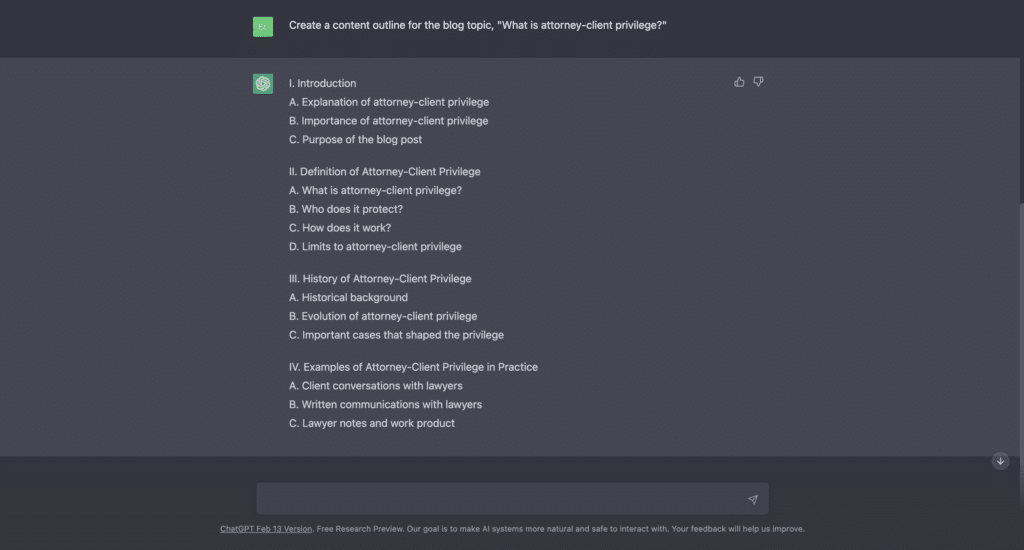
You might also want to include a desired word count to provide parameters on the depth of the outline.
From there, you can review the content outline, make tweaks as needed, and start writing. The process effectively eliminates the step from the process, streamlining content production in the process.
4. Creating Compelling Headlines with ChatGPT
Last but certainly not least, ChatGPT can be an invaluable help when looking to generate engaging and keyword-optimized headers for your content. Your headlines, from emails to blog posts, are the single biggest opportunity to draw audience eyeballs and engagement. Your headline needs to be actionable, honest, and clear–three parameters that can be difficult to combine into just a few words.
A single prompt for ChatGPT allows you to review multiple auto-generated headlines according to your parameters. For example, you can ask it to give you “5 headlines for an article that focuses on Illinois personal injury law”.

From there, ask follow-up questions until you get one or more headlines that seem to accomplish the job.
3 Significant Drawbacks and Limitations of ChatGPT in Legal Marketing
ChatGPT has undeniable potential for legal marketing, but it has significant limitations. Familiarizing yourself with these limitations can help you steer clear of credibility issues, search penalties, and even legal trouble.
We take a look at three significant drawbacks of ChatGPT below.
1. Inaccurate Content in a Highly Specific Field
Let’s begin with the most immediate and pressing concern. Play around with ChatGPT prompts for long enough, and you will inevitably see some inaccurate content. An easy way to check it: ask for details about your alma mater, then see if those details (like the mascot, year of founding, current president, etc.) line up with reality. There are more specific and obvious examples, as well. Asked which mammal lays the biggest eggs, ChatGPT may present an elephant.
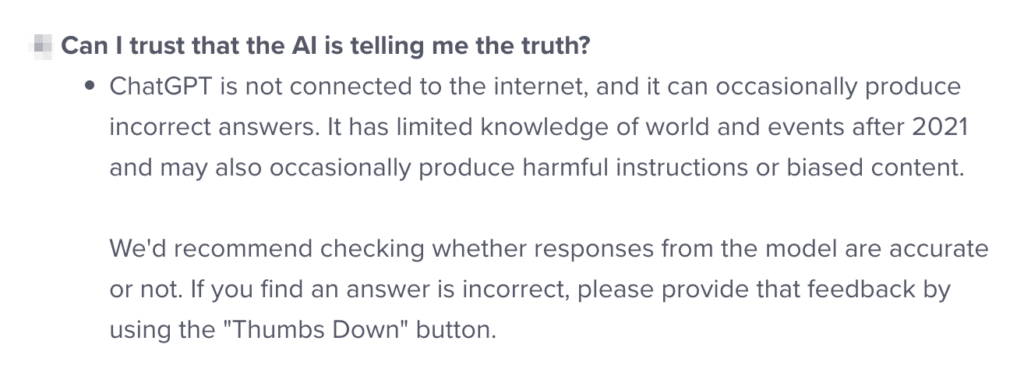
These inaccuracies make sense when considering how ChatGPT is built. Its answers come from source content, but fact-checking is not a part of its programming. Given that it always looks for the next “natural” word to complete a sentence, it likely simply sees ‘biggest mammal’ in the prompt and replies with the biggest mammal.
In other words, this is not a tool that prioritizes accuracy. OpenAI even admitted as much in a recent New York Times article, stating that “ChatGPT sometimes writes plausible-sounding but incorrect or nonsensical answers.”
To say that inaccurate content in legal marketing is a concern is an understatement. Your content has to be accurate about everything — from laws and regulations to how your clients can work with a lawyer — or else you’ll lose your readers’ trust. ChatGPT’s potential for inaccuracies is why it should never be used as an unsupervised content creation machine.
2. Poor Quality Content that Damages Credibility

Unfortunately, the issues with ChatGPT’s content creation abilities don’t end with potential inaccuracy. ChatGPT often produces text that is spammy or simply not written well.
This may not seem like an issue at first glance. If you give it a prompt, all sentences may seem well-structured and the words right for the industry. But especially with long-form content, these words will typically begin to repeat. The depth never goes beyond the surface level.
The result is content that fails in a few crucial areas:
- It’s not engaging to an audience likely looking for actionable advice.
- It doesn’t differentiate you from any other legal content available online.
- It can seem eerily similar to other content produced on the same or similar topics by your competition.
Again, a closer look at the technology behind the tool explains why it produces spammy content. Similar content from competitors is exactly where ChatGPT draws its words from. Originality and high-quality writing are not currently part of ChatGPT’s arsenal.
Spammy content becomes an issue, especially with legal content, when you have to be specific and succinct on any topic you cover. Along with the potential inaccuracies, it’s a major reason why OpenAI openly recommends against using ChatGPT for any type of legal content creation.
3. Potential Concerns with Copyright Infringement
The final potential downfall of using ChatGPT for your law firm website may also be the most significant: the potential for violating content copyrights.
Because the tool draws its knowledge and words from other published content, nothing it outputs is truly original. That, in turn, could lead to potentially serious complications for any business looking to use this content for their own commercial purposes.
To be clear, the bot pulls from enough unique content that it passes most (if not all) online plagiarism tests. But that fact on its own raises potentially significant concerns for entire industries like education. It’s no surprise, then, that we are seeing the rapid development of new, so-called “AI content checkers” that look to detect whether or not the content was written by a human.
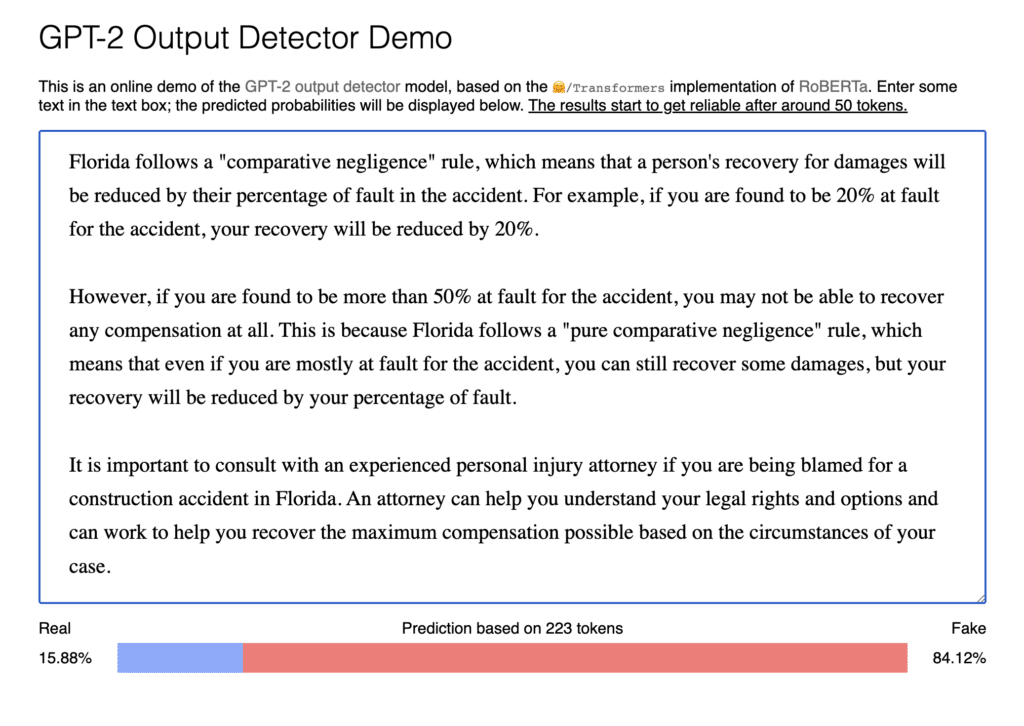
And that’s before we get to the legal issues of copyright infringement. And, as it turns out, the issue of who owns intellectual property created by AI software like ChatGPT is still very much unclear.
That uncertainty extends beyond potential infringements, as well. There’s a reason that the U.S. Copyright Office will not register any content created by artificial intelligence or non-human hands. To have the chatbot write website content for you means diving into that uncertainty, opening yourself and your law firm up to potential jeopardy down the road as the answers to these questions become more clear.
How Using ChatGPT Can Affect Your Law Firm’s SEO
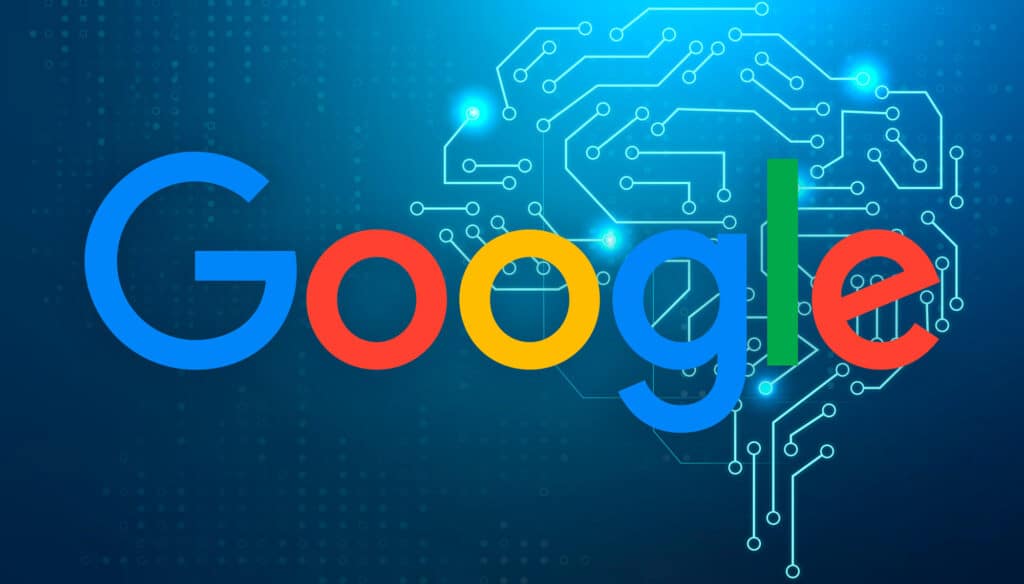
A close examination of these potential uses and drawbacks clarifies one thing: ChatGPT has the potential to be an immensely useful tool for generating content on your law firm’s website. But at the same time, it begins to fail when relied upon for true content creation.
That becomes especially clear when considering the technology’s nuances in search engine optimization.
As mentioned above, the potential indirect SEO benefits of ChatGPT are immense. Its ability to help create keyword research and search-optimized headlines is undeniable. However, heavy use of the tool could have a big impact on your organic SEO strategy.
Google considers content created by AI-enabled chatbots as spam. In fact, the search engine giant has said publicly that it will devalue any AI content that it can find in its search rankings. In other words, your law firm’s search ranking will drop even for the most relevant keywords.
The reason for this clear stance is simple. Google’s priority is providing search results and a user experience that’s as positive as possible to keep users coming back to the search engine as often as possible. AI-generated content, which can be poorly written and even inaccurate, does not pass muster for these strict guidelines.
How ChatGPT Plays Into Google’s New E-E-A-T and Quality Rater Guidelines
In December 2022, Google published a new update to its Quality Rater Guidelines. The update doesn’t expressly mention AI-enabled content creation, but many of its updates nonetheless apply directly to this broader concept.
The new guidelines most famously add an E for Experience to the existing E-A-T guidelines. The new E-E-A-T requires creators of so-called YMYL content (which includes law firms) to add first-hand experience to their content.
In other words, it’s no longer enough to write abstract content that could belong to any law firm. The content also needs to include some elements unique to the content creator. This piece of content makes it unique and is essential to creating authority — the A and T of the original E-A-T.
ChatGPT has no ability to create anything relating to your firm’s personal experience. It doesn’t know what cases you’ve handled or how your previous experience has made you a unique authority on the topic in question. Only human-generated content from a reliable author can satisfy E-E-A-T.
The updated Quality Rater Guidelines also go deeper into what quality website content means beyond its E-E-A-T guidelines. For example, Google assigns a higher quality standard for sites that are managed by professionals compared to volunteers. In addition, content quality is determined not just by how original the content is but also by how much effort and skill went into creating it.
Finally, and especially for YMYL content, Google is actively looking to downgrade websites that could be considered deceptive or cause harm to their audience. That effort is magnified for law firm websites, where erroneous legal advice could cost readers “their money or their life,” as it were. ChatGPT’s issues with accuracy and quality are a major concern in this area.
ChatGPT for SEO–A Major Bust?
Content created by ChatGPT could lead to potentially significant issues. But that doesn’t devalue the benefits this chatbot can bring to SEO. In fact, a recent Search Engine Land article identified six ways in which SEO pros across industries are already using the tool–some of which we’ve already covered:
- So-called secondary content creation, like creating ad copy or social media posts based on existing blog posts and website content.
- Keyword research and analysis, including analysis of which keywords may be more competitive and difficult to rank for.
- Content strategy development, up to and including an editorial calendar complete with strategic check-ins on performance.
- Understanding search intent, helping content creators not just find the right keywords but also the intent of users behind using these (and not other) keywords.
- SEO-optimized title generation, which will automatically follow typical rules on action verbs and title length.
- Composing and managing analytics reports that allow marketers and content creators to measure the success of their legal content marketing efforts.
It’s also worth keeping in mind that ChatGPT as we know it is not done evolving. Future iterations may well increase the number of SEO opportunities presented to law firm marketers. The key, though, will always remain a human touch that can take AI-generated insights and turn them into engaging, original, helpful, and authoritative website content.
Building a Better Legal Marketing Strategy with LawRank
The hype surrounding ChatGPT is real. After all, it grew to 100 million users nearly five times faster than TikTok. And it certainly looks like a sign of things to come in terms of AI-supported marketing.
However, as the examples throughout this guide shows, AI-enabled chatbots like ChatGPT are far from ready to take over the marketing needs of a human team. They may never be. But even the supporting possibilities they offer now can still help marketers create better content for websites, social media, and more.
That’s where a reliable marketing and SEO partner comes in. A partnership like this allows you to plan, build, and reap the rewards of high-quality website content far beyond what a chatbot can do. You can still leverage the benefits a chatbot does provide without worrying about its potential drawbacks.
LawRank can help you grow your business with law firm marketing. We’ve helped our clients grow their online presence and rank for competitive terms in competitive markets. We’ve helped law firms double and, in many cases, triple the amount of leads coming through their door.
Ready to learn more about our SEO for lawyers services? Or do you have any questions related to tools like ChatGPT and how they might fit into your strategy? Contact us to start the conversation today.
